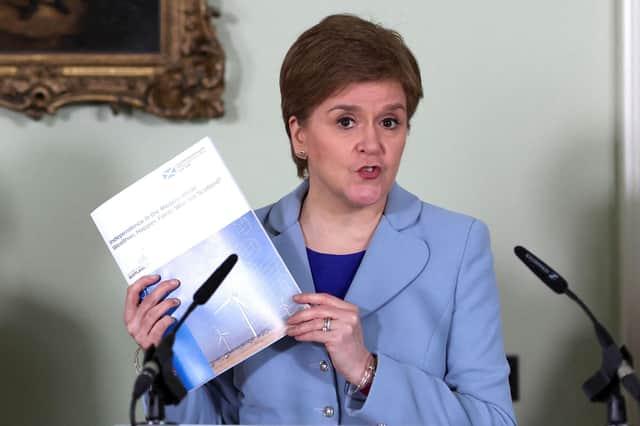Owen Polley: London must not show weakness to separatists


If she got her way, the poll would take place in October 2023. And this wasn’t even the most outrageous position outlined by Scots nationalists last week.
Scotland’s deputy first minister, John Swinney, claimed that Sturgeon would have a mandate to start negotiating ‘independence’ if the SNP wins a majority of Scottish seats at the next general election. He doesn’t think she even needs to wait for a referendum or get over 50% of the vote.
Advertisement
Hide AdAdvertisement
Hide AdThese ridiculous statements tell us a lot about the nature of separatism in the UK and they prove that the government cannot show weakness to people who are fanatically committed to destroying this country.
After the Brighton bombing and the IRA’s failure to murder Margaret Thatcher, the Provos issued a chilling warning: “We only have to be lucky once. You have to be lucky every time.”
That’s a philosophy that separatists in Scotland and Northern Ireland have embraced, even if they reject violence as a means of breaking up the UK.
The Scottish referendum in 2014 was supposed to settle the question of Scotland’s status for the foreseeable future. David Cameron said that the result would apply for a generation, while Alex Salmond claimed it would last “perhaps for a lifetime”.
Advertisement
Hide AdAdvertisement
Hide AdAs Salmond knew perfectly well, though, you cannot ‘settle’ an issue like that in the eyes of extreme separatists, unless they win. The entire reason for their existence, as a political force, is their hatred of Britishness and the UK.
Sturgeon now says that the result of the Brexit referendum in 2016 changed everything in the eyes of the Scottish people, but her argument is nonsensical. There is no evidence that Scots voters want to reopen the ‘independence’ debate because we left the EU. Indeed, they have stubbornly refused to endorse that claim.
In truth, if we had voted to ‘remain’ in the EU, Sturgeon would have concocted a different theory to support her demand. She would have claimed that because of the Tories, or the economic downturn, or the cost of living, or who knows what, that everything had changed and the independence referendum needed to be rerun.
A similar process is at work here in Ulster. People who always wanted Northern Ireland to be annexed by the Republic are now apparently convinced that Brexit has put their aspiration within reach. Does anybody seriously believe that, otherwise, they would not have persuaded themselves of the same thing, but for different reasons?
Advertisement
Hide AdAdvertisement
Hide AdIf the Scots do get a second referendum and vote again to maintain the UK, the SNP will demand another vote in 10, 15 or 20 years time. The process will be potentially endless, because the separatists “only have to be lucky once” and they will keep putting on pressure and issuing ultimatums, because that’s what they do.
For that reason, they will never put all their energies into making Scotland work better, tackling its terrible drug problems or addressing the lack of achievement in its schools. Instead, they scheme tirelessly to cultivate grievances against London, stoke anglophobia and blame all their failures on the Westminster government.
If they are repeatedly given the opportunity, it’s possible that, in the right political circumstances, these tactics could eventually bring success. And then, no matter how dismally Scottish independence fails, there will be no way back to the UK for people in Scotland.
The same is true of Northern Ireland.
Don’t believe for a minute that, if the UK won a border poll, there would not quickly be a campaign for a second vote. Neither the government, nor pro-Union voters should be taken in by the idea that a referendum would kill off nationalist demands for any significant period of time.
Advertisement
Hide AdAdvertisement
Hide AdThe United Kingdom is very unusual, because it has accepted the principle that its nation state can be destroyed by one-off polls in either Scotland or Northern Ireland. Countries that contain serious secessionist movements are not usually as tolerant of separatists’ aspirations.
This peculiarly British liberalism can at times verge on naivety. Think about how many MPs have seemingly accepted that Irish nationalist arguments on the protocol are genuine, rather than questioning whether they’re motivated by undermining Northern Ireland’s place in the UK.
By now we should know — from devolution, from the Scots independence referendum and from countless concessions to Irish nationalism – that giving separatists what they want rarely creates stability or neutralises their campaigns. If anything, their demands become louder and their attempts to cultivate grievances intensify.
Westminster should take a tougher position against separatism; saying clearly that there will be no more referendums without overwhelming evidence of public support and increasing its efforts to make the nation’s government and symbols more visible throughout the UK.